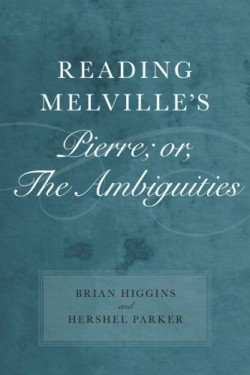Reading Melville's Pierre; Or, the Ambiguities
“Herman Melville Crazy” was the assessment of a typical review of his Pierre: or, the Ambiguities, published in 1852, the year following the appearance of Moby-Dick. Other reviews were similarly devastating: “sound, fury, and perfect incomprehensibility;” a “dead failure;” “horrors and trash to the last;” “turgid, pretentious, and useless;” “unhealthy;” “abominable;” and “monstrously unnatural.” A work Melville believed would be greater than Moby-Dick, the incest-themed Pierre lost Melville his British publisher and is generally thought to have permanently damaged his career.
Brian Higgins and Hershel Parker are distinguished Melville scholars in matters of bibliographical and biographical criticism. Higgins is professor emeritus at the University of Illinois-Chicago, while Parker is professor emeritus at the University of Delaware. The two scholars have been instrumental in bringing attention to the sequence of events by which Melville produced a complete manuscript of Pierre only to revise that work, largely for the worse, after signing a disastrous contract for the book during a period of acute financial distress. The original version of Pierre chronicles the life of Pierre Glendinning, heir to a life of gentle ease who repudiates family, social position, and fiancée to enter a scandalous ménage with his mysterious half-sister, Isabel. Borrowing on Gothic motifs as his friend Hawthorne had done in The House of the Seven Gables, Melville weaves a fable concerning the radical break with conventional pieties necessary to achieve creative freedom in life and art—a perspective nicely expressed by Isabel: “I will live my nature out. I will stand on pride. I will not budge. Let come what will, I shall not half-way run to meet it, to beat it off.”
Higgins and Parker are editors of the Kraken edition of Pierre, a reconstruction of the early manuscript that Melville completed before, as they have deduced, poor reviews of Moby-Dick and the humiliating terms of the contract set off a round of revisions and insertions that transformed Pierre into the book readers know today. Reading Melville’s Pierre: or the Ambiguities is the latest development in bibliographic scholarship on the novel. This study conducts a close reading of the Kraken edition followed by an analysis of the inserted autobiographical chapters that recast Pierre as an author. The editors conclude that these additions, not constructed with an eye toward the already existing chapters, had the effect of “botching his original achievement.” The early completed manuscript was an achievement in “psychological fiction,” an extension of his meditation in Moby-Dick on “complex states of mind and complex motivations, both conscious and unconscious … the determinant role of face in human lives … the elusiveness of Truth and the impossibility of final knowledge.”
Higgins and Parker lay out a strong evidentiary chain to make their case that the interpolated chapters were the product of a different impulse and mood than the original manuscript, and that the long-standing formalist practice in criticism of Pierre to read Melville’s novel as a unified whole fails to “acknowledge and analyze his dual or multiple intentions.”
Disclosure: This article is not an endorsement, but a review. The publisher of this book provided free copies of the book to have their book reviewed by a professional reviewer. No fee was paid by the publisher for this review. Foreword Reviews only recommends books that we love. Foreword Magazine, Inc. is disclosing this in accordance with the Federal Trade Commission’s 16 CFR, Part 255.

